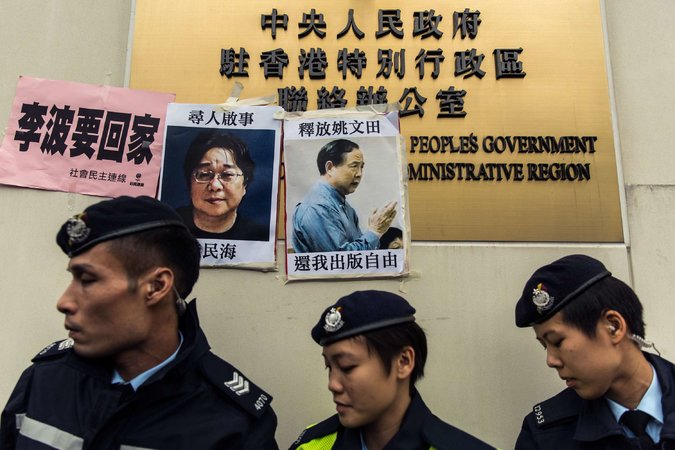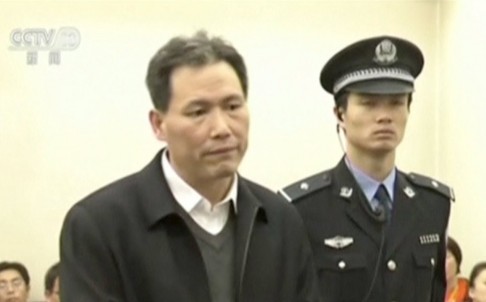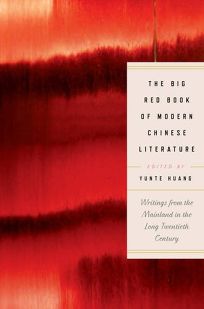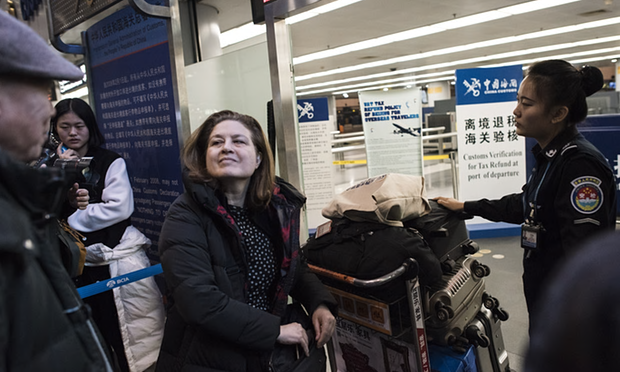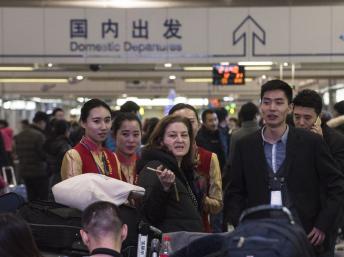MONTREAL/MUNICH | By Paul Mooney and David Lague
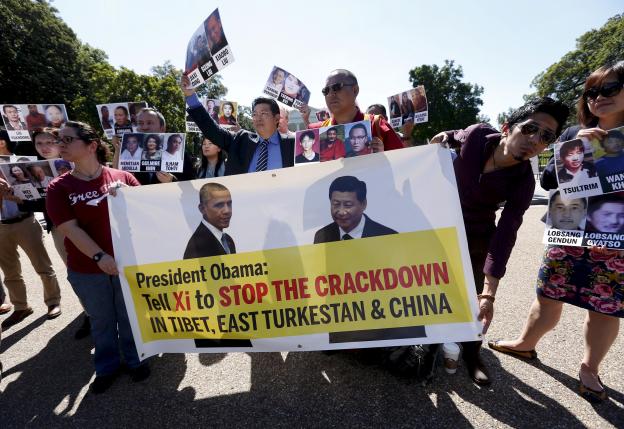
Tibetan, Chinese, Uighur and American activists rally outside the White House in Washington, in this September 16, 2015 file photo. REUTERS/Kevin Lamarque/Files
Erkin Kurban, an ethnic Uighur from China’s frontier region of Xinjiang, left his homeland for Canada back in 1999. When he returned to Xinjiang for a visit in April 2013, he had not seen his family for more than 13 years. Kurban was especially excited about seeing his 85-year-old mother.
His joy was short-lived. On the third day after his arrival, an agent of China’s pervasive security police summoned him for a meeting at a police station. Over the next 10 hours, Kurban, a 55-year-old long-distance truck driver, was grilled on his activities in Canada and the United States. His interrogators urged him to send reports on fellow Uighur exiles when he went back, leaving him with a stark choice: Spy for China or never come back to see his family again.
The interrogators had a particular target in mind. For 90 minutes they demanded information on Washington-based Rebiya Kadeer, the most prominent leader of the Uighur community in exile and an outspoken critic of China’s treatment of the Turkic-speaking Muslim people in Xinjiang.
“They asked me who was active in the leadership and who was doing what,” said Kurban, as he steered his 53-foot tractor trailer on a long haul trip from California to Montreal. “They also wanted to know what Rebiya Kadeer was doing and what projects she had.”
Kurban’s interrogation is part of a global campaign of intelligence gathering and harassment by China against the Uighur community abroad. The effort is aimed at neutralizing the community’s leaders, whom Beijing accuses of plotting independence, and sowing distrust and discord among its members. With the power to treat family members back home as hostages, Chinese security services have strong leverage over Uighurs living overseas, thousands of whom have fled what they say is persecution by the authorities in Xinjiang.
China’s suppression of political dissidents and restive minorities at home is well known. Less documented are Beijing’s extensive and growing efforts to stifle these same populations abroad, including Chinese-born citizens of Western democracies. This examination of China’s methods of exerting control over Uighur exiles in North America, Europe and Australia is based on interviews with exiled Uighur leaders, court records of espionage trials and the findings of asylum cases.
In Germany and Sweden, Chinese spies – some Uighurs themselves – have been convicted of espionage against local Uighur communities. Relatives of exiled Uighur leaders in the United States and Canada have been jailed back in Xinjiang. One prominent Uighur leader said he has been detained or denied entry on traveling to some Western countries after China accused him of terrorism.
“Some might think that once you flee China, you are free,” said Kayum Masimov, president of the Uyghur Canadian Society. “But you are never free.”
In response to questions from Reuters about the targeting of Uighurs, China’s Foreign Ministry said Xinjiang is experiencing one of its “fastest periods” of development. “There will always be some people with ulterior motives and forces who do not wish to see a stable and harmonious Xinjiang,” the ministry said. “Their plots are doomed to fail.”
‘100 PERCENT’ INFILTRATION
Ultimately, Uighur activists say, the goal of China’s global dragnet is less the collection of high quality intelligence and more an effort to intimidate the exile community. Prominent Uighurs say China’s infiltration of their ranks is even more successful than its penetration of Tibetan exile groups critical of Beijing’s policies in Tibet.
“If the infiltration of the Tibetans is 80 percent, then the infiltration of the Uighurs is 100 percent,” said Enver Tohti, a former cancer surgeon from Xinjiang who was granted refugee status in the United Kingdom in 1999. “So far here in the U.K., I’ve had four Uighurs confess to me that they have been spying.”
In Xinjiang, which borders Kazakhstan, the Chinese authorities are battling to contain unrest that has seen hundreds of people die in clashes in recent years. Beijing blames the violence on Islamist militants. Human rights groups say China has failed to produce convincing evidence that it faces a cohesive militant force. Harsh controls on the religion and culture of Uighurs are the primary reason for the violent outbreaks, they say.
China denies that repression takes place and has blamed a number of lethal attacks in recent years on militants from Xinjiang. In the southwestern city of Kunming, 31 people were killed at a train station on March 1, 2014, by knife-wielding assailants. In March this year, China executed three people for their role in the attack. The government said the culprits were separatists from Xinjiang.
Beijing has seized on the attacks as proof that it faces a significant threat of Islamist radicalism, and has labeled a group of Uighur leaders, some citizens of Western countries, as terrorists.
These allegations have hindered the travel of exile leaders such as Dolkun Isa, executive chairman of the Munich-based World Uyghur Congress, the leading Uighur group which advocates democracy and human rights in Xinjiang. China named Isa, a former student activist in Xinjiang, on a list of Uighur terrorists in 2003. Germany accepted his claim of refugee status and granted him a passport in 2006.
That status hasn’t always helped. Isa says he has been detained or refused entry when traveling to countries including Switzerland, the United States and South Korea. He has since been allowed into Switzerland and the United States, which he said granted him a 10-year multiple entry visa in 2012. Isa says he condemns all terrorism.
The Chinese Foreign Ministry said Kadeer and Isa have colluded with terrorist forces, but did not provide any evidence.
TROUBLE IN HUNGARY
In the detention cases, Uighurs say some foreign governments are responding to diplomatic pressure from an increasingly wealthy and powerful China.
The Munich-based vice president of the World Uyghur Congress, Umit Hamit, a German citizen, said he didn’t expect trouble in Hungary, a country he had visited eight times in 10 years without any problems.
On May 30, 2013, that changed: He said he was detained while leading a Uighur youth delegation to Budapest. Police cordoned off and searched the motel where his 28-member group was staying as if they were looking for a bomb, according to Hamit’s account of the incident. “They didn’t find anything,” he said in an interview in Munich.
After contacting the German embassy, Hamit was released, but the Hungarians kept up the pressure. He said he was told by the police that he had one hour to leave the country.
“I told them I don’t have a car here,” Hamit says. “They said, ‘Okay, we’ll give you two hours.’”
The World Uyghur Congress later said it suspected Hungarian authorities were acting on false allegations from China that Hamit was a terrorist. The Chinese Foreign Ministry had no comment on the incident.
Economic ties between Hungary and China have blossomed in recent years. In June, Hungary became the first European country to sign a cooperation agreement with Beijing on its “Silk Road” initiative to develop trade and transport infrastructure across Asia and beyond. Last month, a consortium led by China Railway Group was awarded a 10 billion yuan ($1.54 billion) contract for building the Hungarian section of a railway that will link Budapest with the Serbian capital Belgrade.
China’s growing economic clout, and the diplomatic leverage that has brought, are enabling Beijing to impose its will far beyond its borders. Reuters reported this year how Beijing is using intimidation tactics at the United Nations Human Rights Council in Geneva to silence critics there. Another article documented how China is backing a Buddhist sect that operates in the West as part of its strategy to discredit the Dalai Lama.
In the case of the Uighurs, China’s efforts at control now stretch thousands of miles beyond Xinjiang.
In the past year, Uighurs fleeing Xinjiang have reached Turkey via Southeast Asia. Not all have made it. In July, Thailand forcibly repatriated more than 100 Uighurs to China. The move was condemned by the United States, which said the Uighurs could be harshly treated back in China. Thai Prime Minister Prayuth Chan-ocha said it wasn’t the fault of his government if the Uighurs faced problems back home.
SPYING FOR CHINA
Extensive spying on Uighur exiles was the focus of a 2011 court case in Munich. The Bavarian capital is home to about 650 Uighurs, one of the biggest single communities in the West, said Isa of the World Uyghur Congress, or WUC, who gave evidence at the trial.
Prosecutors charged three Chinese men with illegal “secret service activity,” Munich court records show. One of the suspects, a 62-year-old Chinese man identified only as “G” in the records, was accused of “spying on the Uighur community in Germany and sending the information he gathered to the Chinese intelligence service.”
According to the court records, the man “regularly reported to his intelligence service contact person – by telephone or in personal meetings – on planned Uighur demonstrations and events. He also passed on information about Uighur exiles and the WUC.”
The three men were given suspended sentences for spying, according to a Bavarian Interior Ministry annual report. “The Chinese intelligence service case officers operating under the cover of diplomats working at the Chinese consulate general in Munich subsequently left Germany,” the report said.
Isa says security officials in China are still collecting information. “We know the Chinese government and Chinese police call Uighur people here in Munich,” he said. China’s Foreign Ministry didn’t comment on the case.
In Australia, concerns over Chinese surveillance of Uighurs have helped refugees seeking asylum.
In a review of an asylum application for an unnamed Uighur man in September 2011, Australia’s Refugee Review Tribunal concluded that the activities of Uighurs living in the country were likely being reported to Chinese authorities. As a result, it found, “the applicant may be at risk of persecution for his participation in these activities if he were to return to China.” The tribunal ruled that the applicant was entitled to asylum.
The tribunal also cited the sworn evidence of Alim Seytoff, president of the Uyghur American Association. Seytoff had testified in an earlier case that “there is an extensive network of spies including some Uyghurs, who regularly monitor the activities of Uyghurs throughout the Western world and report on their activities to the PRC (People’s Republic of China) authorities.”
THE PRICE OF ACTIVISM
For China, the exile Uighur leadership poses a challenge to Beijing’s narrative on Xinjiang. Leaders like Kadeer regularly highlight the trials and imprisonment of Uighur activists, including Ilham Tohti, an economics professor who was jailed for life on charges of separatism in September 2014. The leadership also organizes protests outside Chinese embassies in Western capitals and lobbies politicians in their adopted countries.
China’s Foreign Ministry said that in the case of lham Tohti, “the facts of the crime are clear and there is cast iron evidence. During the trial, the rights of Ilham (Tohti) and his defending team were fully guaranteed.” Foreign journalists and diplomats were barred from the courtroom during the trial.
There is a price to pay for activism, especially for the highest-profile Uighur leaders. And the cost often falls on their families back in Xinjiang. Some relatives are jailed or beaten. Others are prevented from ever reuniting with their exiled children or siblings.
“They use your family ties to stop you from doing whatever you’re doing and to get you to do what they want you to do,” Mehmet Tohti, the founder of the Uighur organization in Canada, said in an interview in Toronto.
Tohti said he has not been allowed back to Xinjiang in close to 25 years, and his parents have been blocked from leaving China to visit him. Even extended members of his family cannot obtain Chinese passports to travel abroad, he said. The Foreign Ministry didn’t comment on Tohti’s case.
Even minor figures in the exile community feel the pressure. When truck driver Kurban returned in 2013 to Urumqi, the regional capital of Xinjiang, he says his interrogators had a file on him. They knew he’d been in Montreal for 13 years. And they knew the names of many Uighurs living in Canada.
When Kurban protested that he was a Canadian citizen, he said, one of the interrogators replied: “When you’re here, we can do whatever we want.” At one point, an interrogator asked for his Canadian passport. “He looked at it and then threw it to the ground,” said Kurban.
When quizzed about Rebiya Kadeer, the Uighur exile leader living in the United States, he said he told the interrogators he was poorly educated and had no knowledge of her activities.
That wasn’t true. Kurban and Kadeer say they knew each other when they both lived in Urumqi. Kurban later participated in Uighur political events in Washington after arriving in Canada in 1999.
Kurban, like most Uighur exiles, refers to Xinjiang as East Turkestan, a politically charged term that Beijing views as tantamount to separatism. He says that mention of Kadeer’s name in public is dangerous in China. Uighurs call her Ana (Mama) instead. He said he still gets calls from Xinjiang asking after her: “How is Ana? How is her health?”
His interrogators in Xinjiang “asked again, again, and again” about Kadeer, he said. “And I repeated, repeated and repeated: Rebiya Kadeer is an old woman. Why is the Communist Party afraid of her?”
OUTSPOKEN CRITIC
Outside China, the 69-year-old Kadeer is Beijing’s most prominent Uighur critic. She became a millionaire property and trading entrepreneur and one of China’s richest women as the country’s economic reforms took hold in the 1980s. At first she was embraced by the Communist Party. She became a member of China’s prestigious but largely rubber-stamp parliament, the National People’s Congress.
After Kadeer started speaking out against Chinese abuses in Xinjiang, she was detained in 1999. She was arrested on her way to meet a U.S. Congressional delegation in Xinjiang and sentenced to eight years for “stealing state secrets,” according to the website of the World Uyghur Congress.
Ultimately, Kadeer spent almost six years in jail. In 2005, under strong international pressure, Beijing allowed her to leave for the United States. Since 2006, she has been president of the World Uyghur Congress.
For that activism, Kadeer says her family has paid a high price. Some of her children were jailed in China after she arrived in the United States and ignored a Chinese demand that she refrain from getting involved in politics.
One son, Alim Abdureyim, was given a seven-year sentence, and a second, Kahar Abdureyim, was fined after both were found guilty of tax evasion in 2006, according to the World Uyghur Congress website. The two were sentenced on November 27, 2006 – the day Kadeer was elected president of the Congress, the website said. A third son, Ablikim Abdureyim, was sentenced to nine years in jail in 2007 for engaging in secessionist activities.
“They didn’t commit any crime,” Kadeer told Reuters at her office in Washington. “They just happened to be my children.”
Because of her political activism, she says, family members are unable to find work and are prohibited from leaving Xinjiang. “It’s like living in an open prison,” she said.
Kurban says his interrogators put him through four hours of questioning about Kadeer and other exiles. When it was over, he was told he must return to Canada within 48 hours.
As he got ready to leave the police station, Kurban says, he decided he would pretend to cooperate with the security officers to prolong his stay. That led to another six hours of questioning, during which the security officers filled 10 A4-size pieces of paper with his answers, he said.
At the end, he signed the document, affirming it was an accurate report. “But I had lied about everything,” Kurban said.
All through the interrogation, Kurban’s two younger brothers waited for him in the police station. “When I got out they were white with fear,” he said.
For the remainder of his almost two-month stay, he visited the police once a week.
Before leaving Xinjiang, Kurban said the security agents gave him a mobile telephone number in China and told him he could call at any time. Just before he departed, a Uighur security officer offered him rewards if he cooperated after returning home. One enticement was the offer of a permanent residency card, which would have made it easier for him to return home and travel around.
Kurban had no intention of cooperating. “I told my mother I won’t come back again,” he said. “She knew already it was the last time I’d see her.”
When he returned to Canada, Kurban called Kadeer and told her the whole story. He also contacted the Canadian Security Intelligence Service and did the same.
A month after he got back, one of Kurban’s interrogators called and asked if he had information to provide. Kurban said he stalled, explaining he had just gotten home and had been busy. Over the next four or five months, he was called several times. Each time, he said, he made excuses. The calls have stopped, for now.
(David Lague reported from Hong Kong, Munich, Berlin and London. Paul Mooney reported from Montreal, Toronto, Bangkok, Washington and Tracy, California. Additional reporting by Greg Torode and Arshad Mohammed in Washington, Ben Blanchard in Beijing, Paul Carrel in Berlin, Joern Poltz in Munich, Simon C. Johnson in Stockholm, Toby Sterling and Anthony Deutsch in Amsterdam, Tom Miles in Geneva, Krisztina Than in Budapest, Leah Schnurr in Ottawa and Jack Kim in Seoul. Editing by Peter Hirschberg.)
Source: http://www.reuters.com/article/us-china-uighurs-idUSKBN0UD1BE20151230

